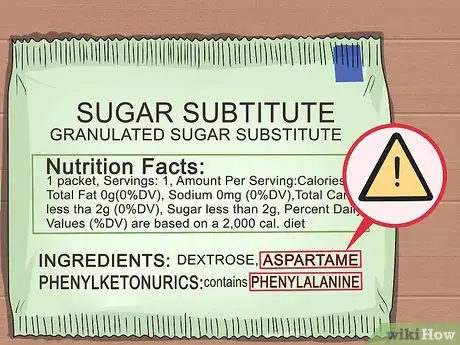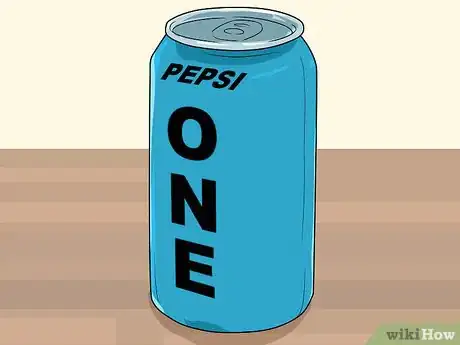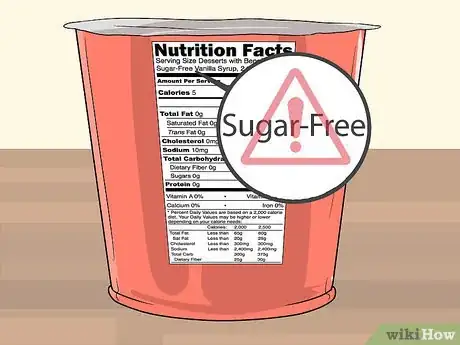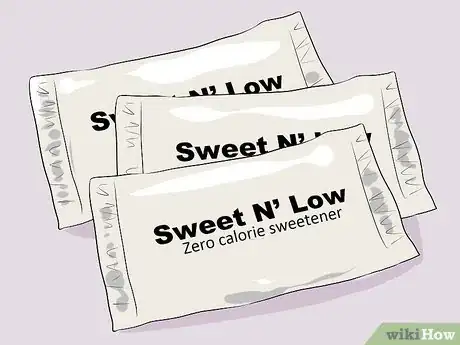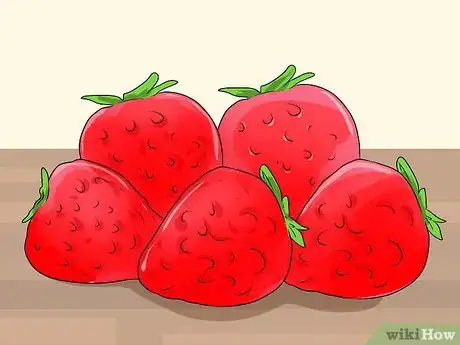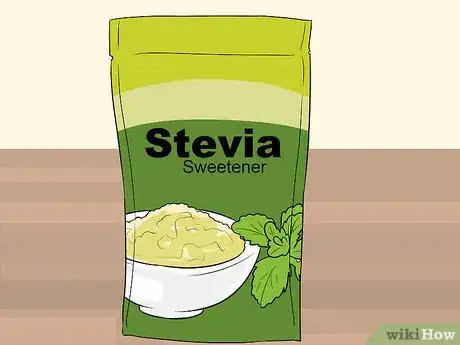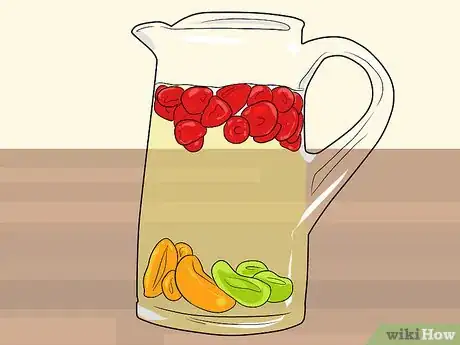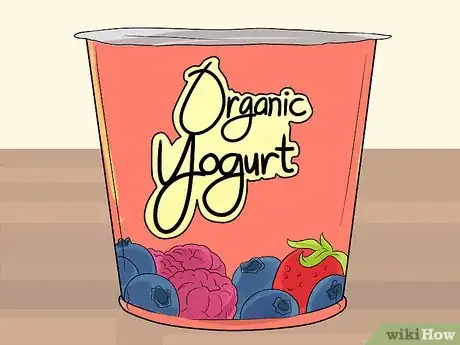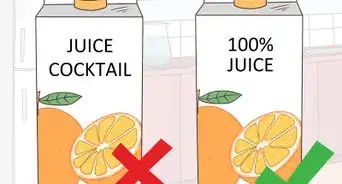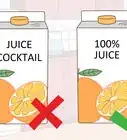This article was co-authored by Courtney Fose, RD, MS. Courtney Fose is a Registered Dietitian and Certified Nutrition Support Clinician at the University of Arkansas for Medical Sciences. She has worked as a Dietitian since 2009, and received her MS in Clinical Nutrition from the University of Arkansas in 2016.
This article has been viewed 24,646 times.
One of the most common artificial sweeteners today, aspartame, also known as phenylalanine, has been linked to certain health problems. People with phenylketonuria (PKU) cannot consume aspartame because their bodies cannot break down the amino acid phenylalanine. Aspartame is a low-calorie artificial sweetener that is sold under brand names Nutrasweet and Equal.[1] Avoid aspartame by educating yourself on the kinds of products that can contain aspartame, by using healthier alternatives, and by consulting professional health sources.
Steps
Determining which Products Contain Aspartame
-
1Check the labels of processed foods. On the back of your food products, read the ingredients or “Inactive Ingredients” section. It is a small section underneath the “Nutrition Facts” section. If you see either the word “aspartame” or “phenylalanine” then the product contains aspartame. Some products even have a warning that indicates people with phenylketonuria (PKU) should avoid the product.
- Products like diet soda and gum usually have a warning about phenylketonuria. However, you should check for this warning on all of the processed foods you consume if you have PKU.
-
2Check the labels of “diet” products. Check the labels of products that specifically say they are “diet," for example, diet soda. Diet products often contain aspartame, however not all of them do. Ensure by checking for aspartame or phenylalanine in the ingredients section.
- Try looking for products that use Splenda or stevia as sweeteners instead. For example, Diet Pepsi has aspartame, but Pepsi One uses Splenda as a sweetener. Splenda is a no-calorie sweetener, also referred to as sucralose.
Advertisement -
3Be careful if a product is labeled "sugar-free". Before buying sugar-free products like yogurt, hot chocolate mixes, flavored water powders, gum, or candy, check the label to see if the product contains aspartame. Not all of these products contain aspartame, so be sure to check the labels.[2]
- Yogurts that are most likely to contain aspartame are processed yogurts that are sugar or fat-free, as well as drinkable yogurts. Some yogurt brands that contain aspartame include Dannon Activia, Mueller "Light," and Weight Watchers. Instead, opt for yogurt that is unsweetened, sweetened with sugar, or sweetened with sugar substitutes besides aspartame.
- Drink powders can be sweetened with aspartame, but not all of them are. For example, Crystal Light is sweetened with aspartame, but Crystal Light Pure is sweetened with stevia.[3]
- Many types of gum and candy, particularly gum and candies that are labeled “sugar-free,” use aspartame as a sweetener. For example, hard candy, breath mints, and candy chews can contain aspartame. Gum products that tend to have aspartame are Orbit and Wrigley’s Extra.[4]
-
4Watch out for sugar substitutes. Sugar substitutes are used to sweeten products instead of regular table sugar. Sugar substitutes can be artificial sweeteners, sugar alcohols, novel sweeteners, and natural sweeteners as well. Here’s a guide to understanding each sugar substitute and the common brands associated with them:[5]
- Artificial sweeteners are synthetic sugar substitutes, which are many times sweeter than real sugar. Artificial sweeteners include acesulfame potassium (Sunett and Sweet One), aspartame (Equal and Nutrasweet), neotame, saccharin (Sugar Twin and Sweet N’ Low), sucralose (Splenda), and advantame.
- Sugar alcohols are manufactured carbohydrates that occur naturally in vegetables and fruits. Despite its name, sugar alcohols do not contain alcohol. They are also not as sweet as regular sugar and contain fewer calories than regular sugar. Sugar alcohols include erythritol, hydrogenated starch hydrolysate, isomalt, lactitol, maltitol, mannitol, sorbitol, and xylitol. Be careful about products that contain maltitol. Maltitol has been associated with a variety of digestive disturbances like abdominal discomfort, gas, bloating, and diarrhea.[6]
- Novel sweeteners are usually combinations of different kinds of sweeteners and are hard to fit into one category. Some examples of novel sweeteners are stevia extracts (Pure Via and Truvia), tagatose (Naturlose), and trehalose (found naturally in honey and mushrooms).
- Natural sweeteners are promoted as healthy alternatives to regular sugar and sugar substitutes, but are still processed sweeteners. Examples of natural sweeteners are agave nectar, date sugar, fruit juice concentrate, honey, maple syrup, and molasses.
Stocking Up on Whole Foods
-
1Buy whole fruits and vegetables. Whole fruits and vegetables have no additives. By having your house stocked with these kinds of foods, you can avoid falling back on snacks or food that contain aspartame. Fruits are also naturally sweet and are a great way to satisfy your sugar cravings. Great fruits for snacking are strawberries, peaches, bananas, plums, apples, and berries, like blueberries.
-
2
-
3Make your own beverages. Bottled or canned tea often contains aspartame. Avoid them by brewing your own tea and adding your own sweeteners, like sugar or honey.
- You can also make your own flavored water.
-
4Buy organic food products. Try replacing some food products with foods that are organic. For example, you can try buying organic yogurt in order to avoid yogurt products that contain aspartame. Alternatively, you can buy frozen meals that are organic to cut down on preservatives, additives, and artificial sweeteners.
Consulting Professional Sources
-
1Talk to your doctor. Your doctor will be able to help you put together a food regimen that is both nourishing and healthy. Your doctor can advise you on ways to avoid foods and products that contain high amounts of sugar. This will help you reduce your sugar cravings, and the desire to consume products that are high in sugar and most likely high in aspartame.
-
2Read nutrition books. Buy or check out books from your local library that will educate you on aspartame and its harmful effects. You can also buy cookbooks with recipes that will help you cut down on unhealthy foods and habits. Look into topics like “strategies for healthy eating” or “how to avoid unhealthy eating.” You can find books online, at your local bookstore, or at your local library.
-
3Read medical journals. Medical journals, like the American Society for Nutrition, provide access to actual case studies on aspartame. Read these articles and educate yourself on the effects of aspartame. Then you can decide for yourself if aspartame is something you want to avoid, as well as how to avoid it.
References
- ↑ http://www.cancer.org/cancer/cancercauses/othercarcinogens/athome/aspartame
- ↑ http://www.md-health.com/What-Foods-Contain-Aspartame.html
- ↑ http://www.md-health.com/What-Foods-Contain-Aspartame.html
- ↑ http://www.md-health.com/What-Foods-Contain-Aspartame.html
- ↑ http://www.mayoclinic.org/healthy-lifestyle/nutrition-and-healthy-eating/in-depth/artificial-sweeteners/art-20046936
- ↑ http://universityhealthnews.com/daily/nutrition/4-common-maltitol-side-effects-more-reasons-to-limit-your-artificial-sweetener-intake/
- ↑ http://deeprootsathome.com/products-contain-aspartame/
- ↑ http://www.medicalnewstoday.com/articles/287251.php
